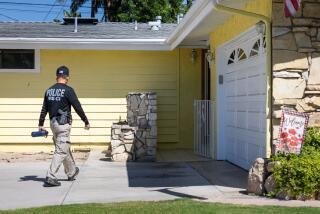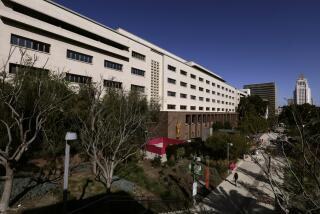Union trusts must provide financial data
Labor union trusts that provide a variety of benefits for workers must disclose detailed financial information under new federal rules designed to root out corruption, officials said Monday.
In announcing the requirement, the U.S. Labor Department cited several cases in recent years of union officers stealing from trusts established for retirement funds, job training and disaster relief.
It was not immediately clear how the rules might apply to a Service Employees International Union local in Los Angeles, whose spending practices are the subject of a criminal investigation. The United Long-Term Care Workers has a related health trust and worker-training charity and is associated with a housing corporation that was founded as a nonprofit to help low-income workers.
Meanwhile, Willis Edwards, vice president of the Beverly Hills/Hollywood chapter of the NAACP and a member of the organization’s national board, said the FBI has questioned him about $25,000 in consulting fees the local paid him last year.
Edwards said the payments were for work on a website and the NAACP had not been involved. “I earned every penny of it,” he said. “I did nothing wrong.”
He appears in a brief video extolling the work of Tyrone Freeman, president of the United Long-Term Care Workers, who later was removed from the union payroll because of internal corruption allegations. Freeman has denied any wrongdoing.
Edwards said the $25,000 had nothing to do with his participation in the video, which has been posted on YouTube.
The video also features tributes to Freeman from the Rev. Eric P. Lee, head of the Southern Christian Leadership Conference of Greater Los Angeles, and Charisse Bremond Weaver, president of the Brotherhood Crusade.
In 2007, the local made $11,000 in donations and non-itemized payments to the Brotherhood Crusade and about $15,700 to the SCLC Dream Foundation, according to the union’s financial filings with the Labor Department.
Earlier this month, Weaver said her role in the video was unrelated to any union money her group received. She also said she would withhold judgment about Freeman until more information about his actions becomes public.
“I’ve had a good working relationship with Tyrone and the union,” Weaver said. She could not be reached late Monday.
Lee has not returned phone calls seeking comment. Freeman has told The Times that all the local’s consulting payments, such as the one made to Edwards, were proper.
An FBI spokeswoman declined to comment Monday.
The disclosure requirements for trusts take effect in January, but the information generally will not be public until 2010, when unions file the first annual forms with the Labor Department. In many respects, the requirements mirror those already imposed on unions, which must disclose most salaries and itemize other expenditures.
The rules for trusts will apply to unions with at least $250,000 in annual receipts.
“With meaningful disclosure, the department hopes to deter potential misuse of union trusts . . . and allow union members to know exactly where their hard-earned dollars are being spent,” Don Todd, a Labor Department deputy assistant secretary, said in a statement.
Unions have accused the Bush administration of adopting punitive disclosure rules because of an anti-labor bias, and the AFL-CIO has challenged some in court.
Attempts to reach officials with the Los Angeles County Federation of Labor and the SEIU’s state council were unsuccessful Monday.
Last month, The Times disclosed that the United Long-Term Workers and the charity have paid hundreds of thousands of dollars to Freeman’s wife and mother-in-law. The union has spent similar sums on a Four Seasons Resort golf tournament, restaurants such as Morton’s steakhouse and an exclusive Beverly Hills cigar lounge.
The Times’ reports have led to the criminal investigation and a congressional inquiry. In one of its internal charges, the SEIU has accused Freeman of violating record-keeping standards for the charity, the housing corporation and a union health trust.
More to Read
Sign up for Essential California
The most important California stories and recommendations in your inbox every morning.
You may occasionally receive promotional content from the Los Angeles Times.











